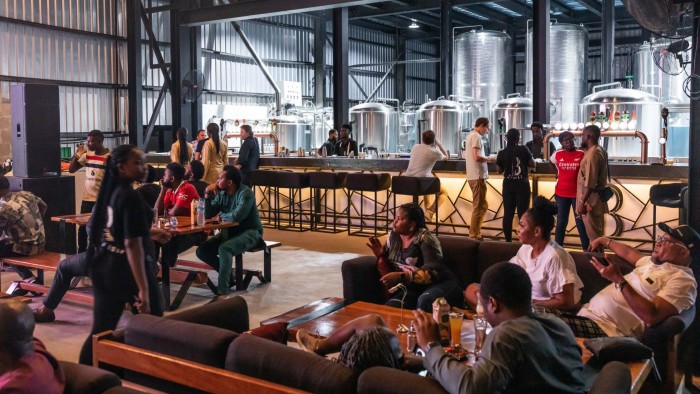How Lagos’s nightlife lost its famous energy

“Detty December” is almost upon Lagos, but you would not know it from the atmosphere in bars and clubs throughout Nigeria’s largest city.
Lagos’s world-famous nightlife reaches its raucous peak during the month, when festive abandon by locals coincides with an influx of foreign currency-carrying diasporans. “Detty” is a light-hearted alternative for “dirty” in Nigerian Pidgin.
But the worst cost of living crisis in a generation, a product of radical economic reforms introduced by President Bola Tinubu, has gutted the west African country’s middle class — and sapped the energy from Lagos’s party spots.
The crowd was thin on a recent “Taco Tuesday” at Bature Brewery, a cavernous open-air pub usually packed with professionals enjoying a cold drink after work in the sweltering megacity. A floor manager wistfully admitted to a drop-off in both visitor numbers and bill amounts as guests curb spending.
Fintech operations manager Queen, 32, who declined to give her surname, said her days of impromptu splurges were gone. “You can’t even come out to have a drink,” she said. “Have you seen the cost of transport?”
Reviewing Bature’s drinks menu — bottled water costs N1,000 ($0.60) while the most expensive cocktail costs N10,000 ($6.20) — she debated the best value cocktail with her friend before settling on a N8,000 mojito. The minimum wage in Nigeria is N70,000 a month.
“I plan every outing these days,” Queen said. “I need to have an idea of the prices because I don’t want any surprises.”

Across Lagos — an economic hub of 20mn people that is home to Afrobeats music and an often ostentatious party scene — bars, restaurants and clubs are feeling the pinch. And proprietors and punters are clear about the culprit.
Since his election last year, Tinubu has embarked on a radical project of economic shock therapy, introducing dramatic reforms that he has said are designed to end the dysfunction that has long plagued Nigeria. The country of 220mn has fallen from being Africa’s largest economy to its fourth.
Tinubu ended fuel subsidies, which for decades allowed Nigerians to pay some of the cheapest petrol prices in the world. The subsidies cull turbocharged inflation, which hit a nearly three-decade annual high of just under 34 per cent in October. The naira has also suffered, losing more than 70 per cent of its value against the US dollar following two devaluations.
These measures have plunged many into poverty, but also destroyed the purchasing power of Nigeria’s professionals, its cohort of tech workers, business executives and engineers who were supposed to be the country’s growth engine. They were also the ones paying for the imported wine and lamb chops offered at swanky haunts in Lagos.

The half-empty bars and restaurants are a far cry from the infectious energy that made Lagosian nightlife famous. The city gave rise to pioneering musicians, such as Fela Kuti in the 1970s, before Afrobeats superstars such as Davido and Burna Boy exploded on to the global scene.
The chorus of “Lagos Party”, a 2009 R&B track by singer-turned-politician Banky W, captures the city’s self-confidence and swagger, boasting: “Ain’t no party like a Lagos party.”
But these days those who can still afford to attend nightspots are less than enthusiastic about paying for the dull atmosphere they often encounter.
Babajide Duroshola, a tech executive who took colleagues visiting from overseas out in Lagos recently, said they went to a popular nightclub and found it so empty they decided to go elsewhere.
“The manager ran after us to ask why we were leaving,” said Duroshola. “This was a place you had to call them before going previously . . . it’s only the strongest that go out now.”

Nahi Halabi, an entrepreneur who runs several high-end restaurants in Lagos’s business district of Victoria Island, said companies were caught between boosting prices in response to inflation and the weakening currency while still keeping meals affordable enough to attract customers.
He added that his restaurants faced three cost issues: paying for imported inventory, such as tomatoes and Australian steak, invoiced in dollars with a slumping currency; increased energy costs in a country with unreliable electricity; and raising salaries as inflation saps staff morale.
Halabi said there had been a clear change in consumer behaviour among his regulars, from customers opting for a glass of wine instead of their usual bottle to those ordering chicken instead of steak — a whole roast chicken for up to three people costs N59,200 while a rib-eye steak costs N96,000.
“People no longer have money to go out for lunch or dinner the way they used to,” Halabi said over coffee at one of his venues, the brasserie Slow. “And we can’t just increase our prices . . . We’re playing catch-up.”

Not being able to dine out or party is a problem many Lagosians would be happy to have. “Tinubunomics”, as it has been dubbed, has left many Nigerians so poor that they struggle to eat three meals a day. Almost two-thirds of households report being unable to eat “healthy, nutritious or preferred foods” in the past month, according to a report by the statistics agency — up nearly 80 per cent compared with five years ago.
Tinubu has said his reforms will encourage investment and ultimately deliver economic growth. Fuel subsidies had risen above $10bn annually, higher than the budgets for health and education.
Dumebi Oluwole, senior economist at Lagos-based data firm Stears, said the reforms were the “foundation” for rebooting the economy but more work was still required. “Long-term success is dependent on government spending priorities . . . Fiscal authorities now need to do the right thing.”
For now, the hospitality industry is still hoping that “Detty December” will change their fortunes. But even a turnaround in festive spending will only offer short-term respite as budget-conscious locals make up a large chunk of their clientele and they are turning to pocket-friendly alternatives such as house parties and raves.
For some, overhauling Lagos’s overpriced nightlife is not necessarily seen as a bad thing. Demilade Akingbe, who runs social club My Friend’s House, which puts on activities such as monthly pop-up supper clubs, said the astronomical price rises at restaurants made it inevitable that people would look elsewhere for fun.
Picking an item at random during a discussion at Ziya café, Akingbe noted that the price of a halloumi pesto sandwich had jumped 200 per cent in two years to N21,000.
“I don’t think we’re losing fun,” Akingbe said. “I think fun is changing and the exchange rate is speeding it up.”
#Lagoss #nightlife #lost #famous #energy




